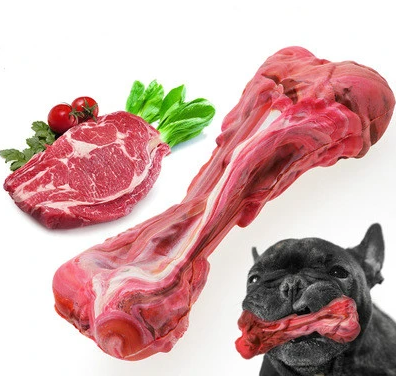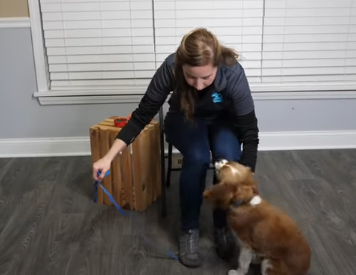Your puppy doesn’t speak your language. All things have to be taught to them. This is why saying “no bite” or “stop biting” really isn’t going to work. And none of the tips will stop your dog from biting in one day! Happy & Polly will share 10 tips in this article to help your puppy with all this biting and learn bite inhibition!
Why Does Your Puppy Bite?
Puppies bite for a few different reasons, and it’s important to take note of why they are biting because this can help solve this problem. Here are the top 5 reasons.
Exploring: Puppies use their nose and mouth to check things out and explore the world. So if your hand is sweaty or smells like food, your puppy is going to nip and bite.
Natural Urge: Puppies have a natural urge to chew and bite. If you do not give them the right things to chew on, they will chew on you and your furniture.
Teething: Puppies who are teething (3-6 months) will want to chew and bite even more because they have sore gums and their adult teeth are trying to pop through their gums and push out the baby teeth.
Movement: Puppies are naturally drawn to the movement which is why when you attempt to pet them, they nip at your hands; or when you are walking, they bite at the back of your pant leg or ankles.
Bite Inhibition: Puppies usually learn how soft or hard they can bite from their littermates or mother during play interactions. When they bite on you, they are also learning how soft or hard to bite and what’s acceptable.
How To Stop Your Dog From Biting
#1 - Right dog chewing toys for your puppy to bite.
It’s important to have the right dog toys on hand when you have a puppy. Nylabones, antlers (deer, moose or elk), marrow bones (beef bones), and Kongs filled with a frozen mixture are great toys to have on hand for a biting & teething puppy. You can check out Happy & Polly website for all the Best Dog Chewing Toys to keep them busy… not attacking your hands, arms, or legs!

#2 - Have a toy in hand and be prepared to redirect
Puppies are drawn to movement, so if you reach to pet your pup or go to grab one of their toys, or try to walk away, and your puppy nips and bites at you, the best thing to do is always have a toy in hand when approaching your puppy or when your puppy comes near you. Be prepared. Immediately insert the toy in their mouth or at least in front of them.
#3 –Yelping “OUCH” in the right way
Yelping “OUCH” or saying “eh-eh” does work but there’s a right and wrong way to do this. It has to be strong enough that your pup takes it seriously. If you sound all sing-song, then it won’t carry much meaning. It has to be as if your arm is being chewed off by a shark minus the theatrics. The key is rewarding your pup when they’ve stopped. This is how they learn to bite less or with less force. Don’t overuse your yelp...it soon won’t mean anything.
#4 – Play without touching Pup
Encourage forms of play that do not include touching your puppies such as fetch or gentle games of tug. When you play tug with a young puppy under 6 months, we tend to play much more gently. It’s as if we are just the toy holder that gently moves.

#5 - Rotate the toys.
Every couple of days, switch out the toys so they seem new and interesting. Keeping all the toys out will lead to your puppy becoming bored with them easily. Keep things fresh and new without breaking the bank. Just rotate dog toys every couple of days.

#6 - Supervise your puppy.
Most puppies can't be trusted to be alone until they are older than 7 months, some even older. If you have to leave your pup for even a split second, then put them in their crate. Crates are a great place to keep your pup safe when you can't keep both eyes on them 100% of the time! It takes only a moment for your pup to chew an electric cord and get electrocuted.
#7 - Exercise your puppy.
Your puppy should be getting mental and physical exercise multiple times a day. A puppy that has a ton of pent up energy will be more likely to bite. They need an outlet to release all that pent up energy otherwise they take it out on you or your home.
#8 - Watch your body posture.
When you drop your body posture, your pup will get overly excited and want to bite you even more. It's like you've become their littermate. If your puppy is a biter, sit in a chair and play with your puppy. This way you have better control of interactions.

#9 - Use the 3 strikes and you’re out rule.
This means if you've corrected using your yelp, OUCH or eh-eh and redirected your pup 3 times, you've gotten up and moved away from your biting pup, then it's time to quietly and calmly give them some crate time. Crates are never used as punishment, but to help refocus or redirect your pup and give them much needed rest. Puppies sleep upwards of 18 hours a day.
#10 - Never play the “I'm going to get you” game
They will think this is an invite to chase and bite. Remember dogs are drawn to movement and your puppy won’t understand why it’s ok to play this game with one member of the family but not with everyone else who doesn’t want to get bit when they interact with your puppy.
Last but not least, what you should NEVER EVER DO if your puppy is biting?
These techniques will not help you stop your puppy from biting! These methods will make your puppy fear you and feel as if they have to defend themselves and bite even more.
- Never hit your puppy when they bite
- Never hold your puppy's mouth closed tight
- Never yell at your puppy for biting, you can yelp or use a high pitched “OUCH!”, but not “bad dog, no bite”.
- Never throw them in their crate for punishment when they are biting, you can calmly and quietly put them in their crate for a reset or rest.

